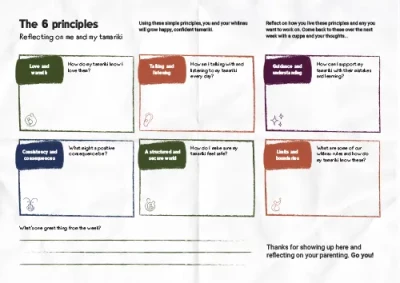
Walking the talk
Understanding what effective and consistent discipline looks like.
On this page
Learning goals
- Build the confidence and ability to parent positively.
- Use a fair and firm approach to parenting.
Background
‘Ngā tohu whānau’, or the ‘Six things kids need to grow into happy and capable adults’ tell us how important consistency and consequences are when parenting young children.
Consistency involves predictability: children connect an action with a consequence from an early age. When parents apply consequences to manage children’s behaviour, there is real learning – without the need for pain or suffering – and relationships are kept intact.
The ‘3 Rs’ of successful consequences for young children is when we make consequences:
- Related – directly between the behaviour we want to change, and the consequence we use
- Reasonable – not too harsh or unrealistic for their age or developmental understanding
- Respectful – their mana stays intact and the focus is on putting things right and helping them learn, rather than punishing or causing them pain.
Children learn from watching big people. We can’t teach children how to behave by just telling them what to do and doing something different ourselves.
- When we do things like shout at them, "Stop yelling!", they’ll soon see that things are unfair or don’t make sense. In other words, we need to ‘walk the talk’.
Discuss a poem
This poem by Dorothy Law Nolte expresses these ideas. Read these first 4 lines to your group. Clarify any words that might be unfamiliar – or better still, give them some real examples.
If a child lives with criticism, he learns to condemn…
If a child lives with hostility, he learns to fight…
If a child lives with ridicule, he learns to be shy…
If a child lives with shame, he learns to feel guilty...
Ask the group:
- Do you agree with the ideas?
Now read the first part of the following lines, and encourage the group to finish each one. They don’t have to come up with the exact words, but what are the general ideas?
If children live with encouragement, they learn to be… [confident]
If children live with praise, they learn to be… [appreciative]
If children live with honesty, they learn… [what truth is]
If children live with fairness, they learn… [justice]
If children live with sharing, they learn… [to be generous]
If children live with security, they learn… [to have faith in themselves and those around them]
If children live with friendliness, they learn… [that the world is a nice place to live]
Your group could write their contributions onto one piece of paper to make their group poem.










